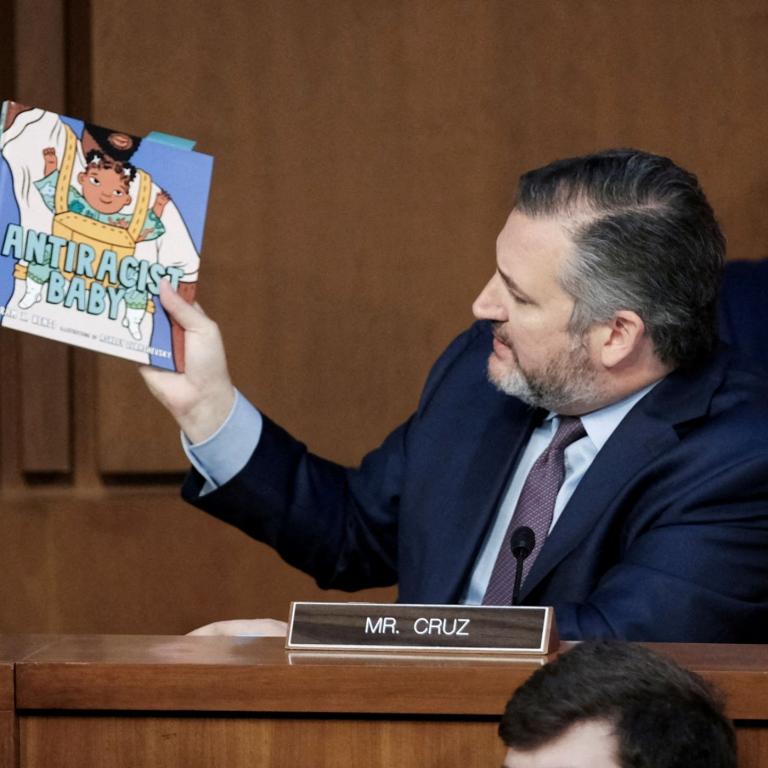
During the congressional hearings for Supreme Court nominee, Ketanji Brown Jackson, Republican Senator Ted Cruz (Texas), brought into question the judge’s views on Critical Race Theory. He used several books that are used by the Georgetown Day School, a prep school where Jackson serves as a trustee, as examples of what he claimed were over-the-top examples of the indoctrination of children with radical ideology. One such book is called Antiracist Baby, written by Ibram X. Kendi (that very name must send shivers down the spine of Ted Cruz). Much has been made of this because, thanks to Senator Cruz’s protest about the use of it, the book has soared to the top of the bestseller lists. I’m not here to talk about the topic of banning books, but I did want to learn more about what Ted Cruz could possibly have against a book that is antiracist. So, I looked into what the book’s message is. It turns out that this book is built on nine tenets aimed at helping to end racism by getting kids to think about its impact. I want to examine these nine points and see what they might reveal about the fear they strike in such right-wing leaders as Ted Cruz. Let’s just go through them briefly, one by one.
- Open your eyes to all skin colors.
How often have you heard well-meaning people claim that they “don’t see skin color?” We know the message that they are trying to portray by saying it. They are attempting to mis-use Martin Luther King quote about not judging someone by the color of their skin, but by the content of their character. But claiming you don’t see skin color is just a disingenuous statement, if not an outright lie. And most black people I’ve spoken to about this don’t like to hear that claim whatsoever. Not only do they see right through it, but they also feel completely disregarded by it. By suggesting that we not see skin color, we are short-changing the fact that millions upon millions of non-white Americans don’t have many hurdles in their way because of their skin color. It’s dismissive of hundreds of years of pain and struggle.
- Use your words to talk about race.
Here again, many well-meaning white folks, myself included far more often than I’d like to admit, prefer to ignore the conversation on race because it’s not comfortable for us. We are either afraid we might say something that might be taken as racist, or that we might be lumped in with people we don’t like to be associated with, or any number of other reasons. Instead, we too often go around in blissful ignorance, convincing ourselves that racism isn’t that big of a problem anymore because we don’t necessarily see it happening right in front of us all the time. Afterall, we have non-white friends, we have non-white neighbors, we smile, nod, even say hello to non-white strangers we pass on the sidewalk. What we don’t do is walk around with non-white skin. What we don’t see is what happens to those non-white friends, coworkers, and sidewalk strangers on a regular basis simply because of who they were born to be. When we don’t see it happen regularly, it’s easy for us to assume it’s a rare thing. But, if we would use our words to talk to our non-white friends and coworkers about their experiences with race, we’d get our eyes opened pretty quickly. I can assure you this true because it’s happened to me—I wrote about one such instance here—and it changed my world view dramatically. Not using our words to talk about race only exacerbates racism in America. Getting children talking about it should not be scary, it should fill us with hope that they might grow up to have greater empathy and understanding.
- Point at policies as the problem, not people.
This addresses something I think is really important to breaking through the fear and misgivings about having an honest and frank national dialogue about race. White people are quick to get defensive when the subject of race is brought up. There is certainly good reason for this. Let’s face it, we are all born who we are, and we have no control over that whatsoever. So, when talk turns to racism, discrimination, and privilege, there is a degree of apprehension that automatically rises in many white people. We start to feel like we will be labeled as villains when we feel more like innocent bystanders. The truth is somewhere in the middle. The average white person isn’t really racist at the core, but when it comes to the policies that have existed in our nation from day one, we are also not exactly innocent bystanders. When we allow the inequitable policies to continue—moreover, when we vote for candidates who work to keep those inequitable policies in place—we lose a degree of our innocence. If we focus on policies and not point fingers at people, perhaps some of the personal stigma some feel attached to racial topics would melt away.
- Shout, “There’s nothing wrong with the people!”
Here is where rubber hits the road. Here is where many of the fundamentalist, Nationalist, evangelical folks start to get really nervous. Far-right Christians will likely never feel comfortable shouting that there is nothing wrong with people. Their whole approach to their faith presupposes that there is something fundamentally wrong with people—although the select number of people who accept the message of the Gospel get washed clean while the rest of society continues to wallow in sin. Therefore, they want everyone to know that there is something wrong with anyone who isn’t a born again, baptized believer in what they believe. It scares the hell out of people like Ted Cruz to think that young children reading messages that promote the inclusion of all people as worthy of equal rights and equity in America. Such messages are seen as a direct assault on their core belief system. That is a really hard obstacle to overcome.
- Celebrate our differences
Once again, far-right Nationalist Christians want a nation where everyone is the same. That’s why so many will claim that they don’t see skin color. They want an education system that funnels every content area through a filter of their choosing. The idea of children being made to feel good about who they are if they aren’t Christians is absolutely appalling to them. Remember when Fox News attacked the legacy of Mr. Rogers, calling him an “evil man” for suggesting to children that they were special just because of who they were? The far-right doesn’t want to celebrate our differences. They don’t want kids thinking they have any real value unless they assimilate to their version of the American Dream—a dream, by the way, that has been made so much harder to achieve by a multitude of road blocks created by hundreds of years of inequitable policies that have discriminated against non-white, non-Christian, non-male, non-heterosexual people. That is the history of our nation that the far-right does not want taught and those are the policies that the far-right continues to try put in place.
- Knock down the stack of cultural blocks.
Without having read the book, I can only ascribe my own meaning to this point, because I’m not 100% sure what it is saying. The way I take this knocking down of cultural blocks is that we have created a hierarchy of cultures in our nation. What has been cultivated, protected, and promoted as the “dominant culture” of America by the far-right is that of the patriarchal white, Anglo-Saxon, Protestant one. All other cultures have found a place lower in the stack of blocks. The far-right Nationalist Christians are pushing very hard now to keep that stack in place. They see as a tremendous threat anyone or anything that would suggest knocking that stack down and leveling the playing field. They see and ever-increasingly diverse America as a monster that must be slain.
- Confess when being racist.
This is a pretty simple concept, but it is a very difficult thing to do. In fairness, our current cancel culture wars have made this an even more difficult thing to do. After all, many people have had to pay a great price for racially insensitive moments many years in their past. But, I don’t think any reasonable people expect anyone to be perfect or have a perfect past. We are all a product of our environment. Growing up in a small, rural town in Indiana, I have dealt with this very thing in my own life. I wrote of my personal journey here. The fact is, most of us have had moments in our past that we are not proud of when it comes to our relationship with the topic of race. Just admitting that would go a long way toward breaking down the barriers and removing the stigma surrounding the national conversation on race.
- Grow to be an antiracist.
This is a natural step from confessing times when we’ve been racist. It’s not unlike what alcoholics go through in recovery. You have to acknowledge a problem first. Then, and only then, are you ready to start working your way out of it. I don’t think there is any story more inspirational than that of someone who has grown as a person. Making progress should be the goal. Yet, being progressive is a dirty word to far too many Nationalist Christian Conservatives, such as Ted Cruz. They work hard to conserve the status quo. But that is only because the status quo has served them so well. This is why books like Antiracist Baby being used in a school frightens them so. This is why they scream “indoctrination” when what they are really terrified of is having their children unindoctrinated and having their minds opened to think critically about their world.
- Believe we shall overcome racism.
Hope is really all we have. Any Christian should understand that. But to a far-right nationalist Christian, believing we can overcome racism would be to admit that we have a problem with racism—that we have built a national system that has racism stitched into our sacred institutions—and they will never agree to that. They sell the message that, if you do it our way, your problems will be over. It is so dismissive of the reality that millions of non-white, non-Christian, non-male American citizens live every day. It’s insulting.
We must believe that we can overcome racism. To do it, we have to approach it with our children. You don’t address such a long-standing, institutionalized problem from the top down, you do it from the bottom up. People like Ted Cruz are fighting to the death the attempts to do that.












